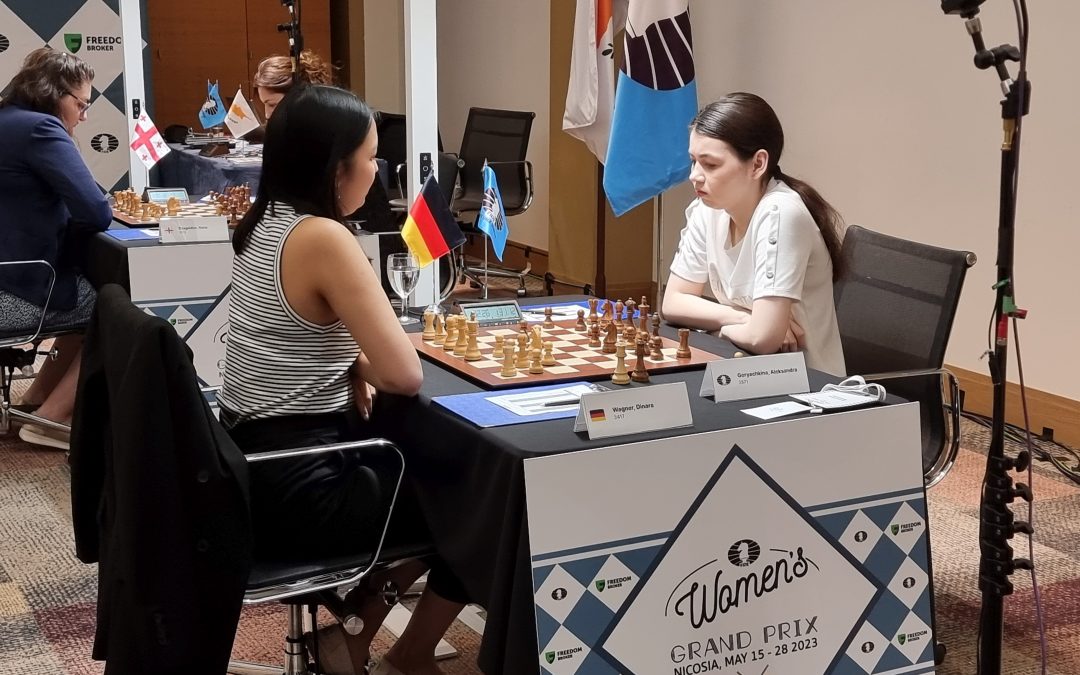At the latest since the Netflix success series 'The Queen's Gambit', women in chess have come into focus - however, the industry is still predominantly male with only 15% female players in competitions. But that's not the only thing chess and the financial industry have in common!
Prize money of 80,000 euros
Fondsfraue Anke Dembowski had the opportunity to be a spectator at the fourth and final stage of the International Chess Federation's Women's Grand Prix, to feel the women's power and of course to support the women. This stage of the Grand Prix will take place in Cyprus from 15 to 28 May 2023. It is an important competition, the quarter-finals, so to speak, for the Women's World Chess Championship, which is held every two years. 12 candidates will play against each other for a fortnight, all women's chess grandmasters or other world-class players, real professional chess players in fact.
 The winners will each receive prize money of 80,000 euros and a place in the semi-finals, which will be held in Toronto in April 2024. After that, it's on to the final, where the women's world championship will be played. The current reigning world champions are two Chinese players. Representing Germany in the current competition in Cyprus is Dinara Wagner, a world-class chess player who played for the Chess Federation of Russia until 2022 and now lives in Germany (an interview with her will follow shortly).
The winners will each receive prize money of 80,000 euros and a place in the semi-finals, which will be held in Toronto in April 2024. After that, it's on to the final, where the women's world championship will be played. The current reigning world champions are two Chinese players. Representing Germany in the current competition in Cyprus is Dinara Wagner, a world-class chess player who played for the Chess Federation of Russia until 2022 and now lives in Germany (an interview with her will follow shortly).
They are exhausting competitions. "The ladies lose one to three kilos of weight per match, that's how much power the game demands of them," explains Arkady Dvorkovich, President of the World Chess Federation (FIDE), in an interview with Fondsfrauen. The players are able to play through their opponent's next ten or more moves and weigh up what effect they will have on the result of the game - that takes brain power.
Why special women's competitions?
One question seems to hover over the competition: Why are there special competitions for women in chess at all? "Playing chess is actually very exhausting, you need incredible stamina, and in stamina the male players are probably superior to us," says one of the female players in Cyprus. In fact, a single game can last six hours or more.
"Women often don't have the opportunity to focus on chess," says FIDE President Arkady Dvorkovich, and continues: "Women have many other things to do in their lives and can't play chess all day. But to get to the top of the world, you have to play chess all day." He explains that professional chess players train 40 to 60 hours a week, and the ladies on average seem to train slightly less than the men. Mark, one of the international chess journalists on site covering the Grand Prix, can confirm this: "Male grandmasters are really only focused on playing chess. They don't need to worry about organising their daily routine or even the family household. I don't think half of them even drive a car."
The question of why men are better at chess than women can hardly be answered definitively; the answer remains a mystery. There is probably no single reason, but rather a multitude of factors that play a role.
It´s a pity: Currently there is not a single women to be found on the Liste der 100 weltbesten Schachspieler On the list, the world's best are listed with a so-called Elo points system, similar to what we know from tennis.
Role models are also needed in chess
 However, the fact that it is possible for women in principle is Judit Polgár. She is the superstar among female chess players. Born in 1976, the Hungarian was awarded the title of grandmaster at the age of 15, and she made it into the top ten of the mixed world rankings in 2005.
However, the fact that it is possible for women in principle is Judit Polgár. She is the superstar among female chess players. Born in 1976, the Hungarian was awarded the title of grandmaster at the age of 15, and she made it into the top ten of the mixed world rankings in 2005.
The women's chess players can choose between women-only championships (with the corresponding women's titles) and mixed championships. The mixed titles are more prestigious, and Judit Polgár managed to play in this mixed league. "Judit is a great role model for us women chess players, and it's good to know that it's possible for women to get on the mixed world championship lists," says one of the players, and it resonates both admiration for Judit and ambition to match her if possible.
Judit's background is interesting: her parents Lázló and Klara Polgár are educators and hold the opinion that talents are not innate but acquired. As "proof", they taught their three daughters at home and taught them to play chess. The three of them became excellent chess players, Judit in the lead and her two sisters Zsófia and Zsuzasa close behind.
This story provides another reason why women don't often make it to the top of the chess world or to the executive floors of companies: Cultural beliefs and stereotypes that are passed down from generation to generation, and may have already engraved themselves on epigenetics. Epigenetics is the 'second code' of the genetic make-up, which is also used to pass on acquired traits. Breaking it down and changing it is possible, but requires conscious handling and training.
 Pay Gap also in chess
Pay Gap also in chess
It is noteworthy that there is also a gender pay gap in chess: The prize money in the women's chess championships is significantly lower than in the mixed championships. "It's often only about a third," chess journalist Mark knows. Of course, one has to admit that the mixed championships with their higher prize money are just as open to women as the women-only championships, but the competition in the mixed championships is much tougher.
"I don't think it's a deliberate discrimination against women, it's the market that regulates it. People are more interested in mixed chess games than in women-only games, just as they are more interested in men's football than in women's football. That's why the pay is higher for men. The market can simply pay more here," Mark says. Tennis might be one of the few exceptions here. "Yes," Mark says, "women's tennis is popular, a lot of people like to watch it. There's just a big market there!"
What do we learn from this excursion into the world of sport and chess?
- In publicly perceivable competitions, there are significantly fewer women to be seen than men
- Women - just like men - can achieve top performance. Individual examples show that it is possible.
- Gender stereotypes that have been instilled and consolidated over the centuries shape the opportunities that women and men have. Such clichés can be broken down, but this is not possible without the corresponding awareness and effort.
The International Federation of Chess Federations (FIDE) is committed to promoting girls in chess and opening up opportunities for them both at grassroots level and on the world chess stage. Culture, e.g. Netflix series like 'The Queen's Gambit' can help to promote interest in women's chess. And ultimately, it also needs promoters who make breaking down gender stereotypes their cause at heart. In the case of the Women's Chess Grand Prix in Cyprus, it was Timur Turlov, CEO of the online broker Freedom Finance.
And those who would like to follow the 12 female chess players at the Grand Prix in Cyprus can do so via the Verbands-Website FIDE or via www.lichess.org.
Fotos: Hellen Smith



